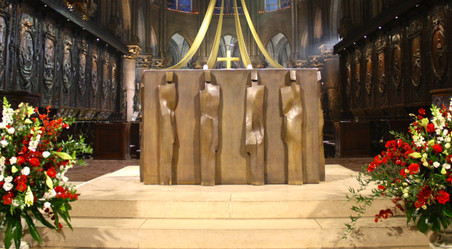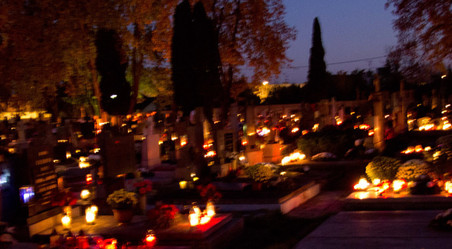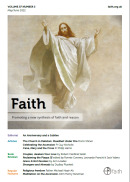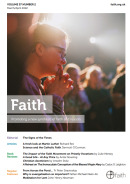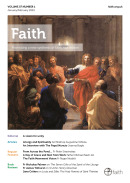Featured
Marriage and the Holy Trinity

Family Breakdown and its Consequences
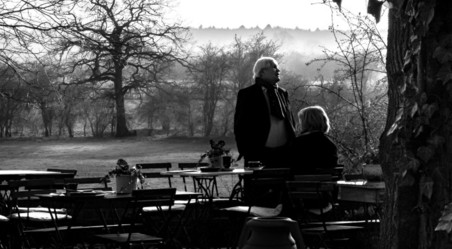
Interview: Newman, a village, and a link with St Nicholas
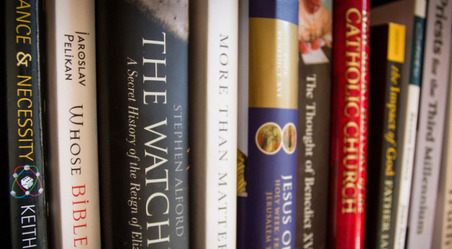
Joanna Bogle visits the Sisters of The Work at Littlemore
Holloway on… The Covenant of Christian Marriage: Part I
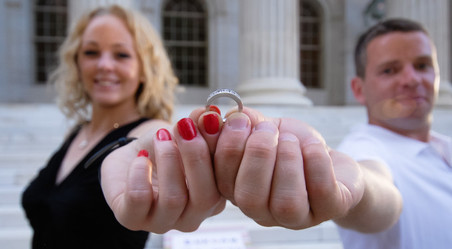
All great love is union and communion. The love of God is a personal joy as invigorating to the inner man as youth and life abounding. It is a holy communion with that Love who grows not old, the love God bestows and which we sense reaches its fulness in the Holy Eucharist. And in this love it is God who does the wooing, God who takes the initiative. All deep friendship found down the years of life, especially when enkindled by a mutual love of God and joy in His service, forms an alliance, it is a sort of covenant between men because first a union with Christ.
Book Review: What inspired the heroic young resisters to Nazism?
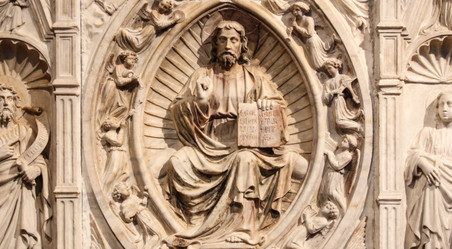
On 18 February 1943 three students at the University of Munich were convicted of high treason and executed by guillotine. Hans Scholl (25), Sophie Scholl (21) and Christoph Probst (24) had been members of the White Rose resistance group which between 1942 and 1943 produced and distributed leaflets calling for resistance to Nazism and an end to the Second World War. A further series of trials followed as other members of the group were rounded up. The final White Rose leaflet was smuggled out of Germany and intercepted by Allied forces, with the result that, in the autumn of 1943, millions of copies were dropped over Germany by Allied aircraft. The sacrifice of these young people, a story which is well known in Germany if not in the UK, is remarkable. Even more extraordinary is that Hans and Sophie had been enthusiastic members of the Hitler Youth, indeed defying their anti-fascist father by doing so.
Book Review: Can the priesthood renew society?
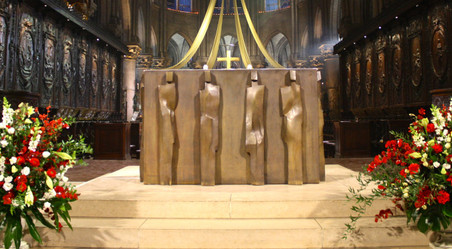
When I saw the title of this book, I imagined it would be a breezy and ‘popular’ treatment of its subject – easy reading, in fact. The reality was slightly different. William J. Slattery is himself a priest and, it is clear, something of a scholar as well. His work was conceived while he was pursuing higher studies in Rome, and the book comes fully equipped with a full range of scholarly apparatus, including a ‘select bibliography’ of some six closely-typed pages. Not quite the ‘easy reading’ I had imagined, then – but a very rewarding read for all that.
Book Review: Silencing the outer voices so that we can hear the inner ones

One reviewer describes this book as a gem, and it is certainly no exaggeration to describe it in this way, as the Bishop of Oakland, California, does. Moreover, he goes on to say something particularly important and significant: ‘It will make you want to pray.’ I can think of no higher recommendation for a book, especially as prayer is the only way we can find that vital and unique increase in our human love. To want to pray more involves the vital first step we need to take in order to continue this important journey.
DVD Review – Uplifting Grace

In just over thirty minutes, Frs Marcus Holden and Andrew Pinsent give a good overview of grace, without which we could not live our lives as Christians. Beginning with a clear definition of grace as sharing in the divine life, the “talking heads” style is broken up with images of the modern world and of sacred art. The DVD explains that it seems impossible to share in God’s divine life but that grace enables us to enter into the mystery of the Holy Trinity. Throughout the DVD, we are shown how grace is received and its impact on Christian life. Finally the presentation turns to Our Blessed Lady as the one creature who is Full of Grace and as such, she shows us what grace means.
-
Christmas: a time to bring healing and hope
With this issue of FAITH magazine, we bring Christmastide greetings to our readers. Their number is growing – recent promotional work at Catholic gatherings this past summer introduced the magazine to a number of new readers. Welcome! It’s a cliché to say that Christmas is a “family time”. But clichés usually hold some wellestablished truth: that’s why they become clichés. Christmas Dinner ought to be – for many still is – a grand gathering of family and clan around a table with good food and with glasses raised in toasts and a generous host dispensing large quantities of good cheer.
Britain in 2018
But Christmas in the Britain of 2018, along with Christmases of the past half-century in our country, will see many families divided. Children will be ferried from one Christmas dinner to another: Mum and her new boyfriend, Dad and his parents, with some stepgrandparents and half-siblings variously added to the mix over the Christmas gatherings. Cohabitation, divorce, complicated pairings, all make for awkwardness. A thoughtful Christmas feature in a newspaper last year noted a child’s lament about the boredom of being ferried down what seemed endless motorway journeys, with lavatory stops and offers of hamburger meals en route to various step-relatives following parental divorces. Language once regarded as odd is now standard: “My ex-stepmother’s parents”, “My sister’s lesbian partner”. So we make no excuse for featuring, in this Christmas issue of FAITH, some comment and analysis of Britain’s current tragic situation concerning marriage and family life. At a time when food has never been so abundantly available in Britain for this season of feasting – indeed, our major national health problem is obesity – many will be hungry not for food but for family solidarity, love and goodwill, for a renewed confidence in the truth about God’s covenant plan for marriage as the lifelong union of a man and a woman. And the solution lies with the Church.
Message
Christmas is not the right time for great public denunciations of divorce or contraception or same-sex “marriage” in fiery terms from the pulpit. But it is a time to affirm that the Church does not and cannot change her teachings: even a general upbeat message to that effect, without going into much detail, will be understood and will send a powerful message. This is a time to take note of the raw wounds being endured by the many people for whom the breaking up of family bonds has been particularly horrific and for whom this season will be miserable, so an emphasis of the consistency of God’s love for us and the consistency of the Church’s message will offer hope and healing. It is a time for the Church to focus firmly on the truth: God came to dwell among us, he knows our wounds, and he is really and substantially present with us now. He brings that steadfast love about which he taught when he spoke of the Good Samaritan who healed raw wounds with wine and oil and gave a pledge of future care for which he paid full price. Christ is the Good Samaritan and if our journey has been a savage one, with many wounds perhaps inflicted by a savage society imposing or encouraging horrible things, he is there to rescue and help us.
God is unchangeable, reliable, and loving
Many Catholic schools and organisations hold carol services in Advent: these are an opportunity to emphasise Advent as a time of preparation for Christmas and the place of the sacrament of penance (confession). Many people attending services at Catholic churches over Advent and Christmas will not be Catholic: this is time to offer all that is glorious in the liturgy and be generous with candlelight and beautiful traditional music so that the central importance of worship of God is grasped. Many Catholics will be at Midnight Mass who are not at Mass through the year: this is a time to bring a sense of joyful urgency about a new encounter with Christ, noting that as Catholics at Mass this Christmas, we should also be at Mass on every Sunday of the year: Christ calls us to this as we encounter him in the Christmas liturgy. If we have not been faithful to this in 2018 then the Christmas Mass is a time to open our hearts to him and make a fresh start.
A light for the year ahead
Midnight Mass as a sort of sentimental preliminary to general indulgence and socialising with a vaguely troubled conscience does not make for happiness: Midnight Mass as a spark that offers a light for the year ahead, perhaps through the challenging words of the sermon, could be a real Christmas gift. Above all this is a time to bring people close to God. Often, the emphasis even in church at this season is about food for the body rather than the soul: collections of money to fund important projects for the hungry and the poor. Of course such action is essential. But the message of Christmas is not just about encouraging well-fed people to part with their spare cash or their used toys or clothes. Christmas is more soul-searing, more real, than that.
An “edgy” message
Moaning about the “commercialisation of Christmas” tends to fall on deaf ears. We all know about it. More useful and important is a reminder of the hugeness of what Christmas celebrates: God becoming man and sharing directly in our lives. Our entire civilisation in Britain is based on an understanding of that reality: it is why we number our years in the way that we do, it frames our language and our traditions, it has shaped our family structures and is at the core of our common life. So Christmas has, or should have, an “edgy” message, a slightly uncomfortable challenge that will in fact act as a sort of healing to people who know that the wounds in our families and common life cannot be covered with a band-aid while festering beneath.
Evangelise
Christmas is a time to evangelise. The message is that God really is among us, that there is hope here, that the Child in the manger did not leave us but grew to adulthood, served and died and rose again, and is with us still - that we will all one day meet him face to face and that meanwhile our lives have meaning and purpose.

